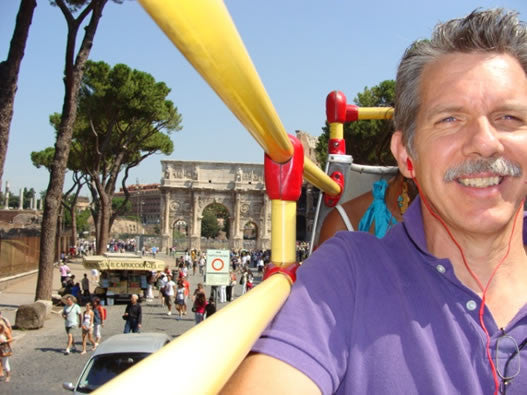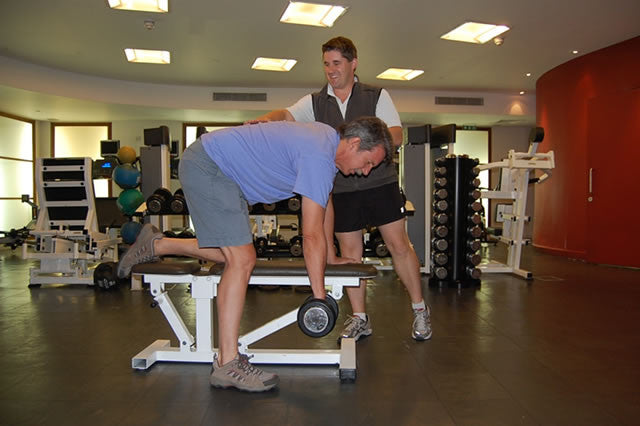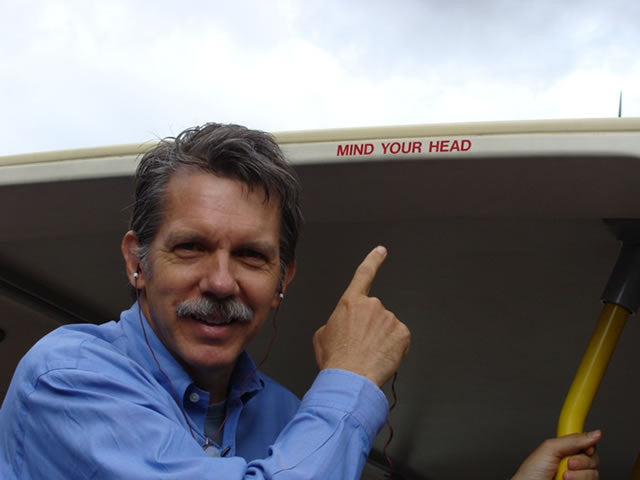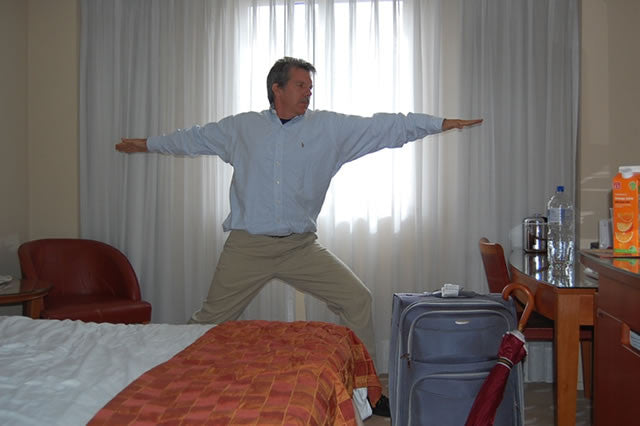Ten Tips for Stress Free Travel
Last summer, my niece invited us to her wedding in the tiny town of Bradninch, England which is about three hours south of London in the county of Devon. I decided to turn this wedding invitation into an epic 17-day family vacation with stops in Rome, Florence, Venice, Paris, London and of course, Bradninch. It was an amazing vacation, but a real logistical challenge which included one 12-hour period where we woke up in a Paris hotel, took a high-speed train that morning from Paris to London, met up with my 21 year old son in downtown London, rented a car an hour later and drove out to Bradninch (on the left hand side of the road) in Friday rush hour traffic!
Of course, this was a challenging day, even for me! But I wanted to see if we could pull off this series of challenges and the whole rest of the trip with as little stress as possible. Here's what we learned about stress and travel along the way. (This is the first of three blogs on the subject of traveling and stress.)
Ten tips for Stress Free Travel

We scoped out the Louvre ahead of time, and figured out how to avoid the lines.
1. Create an itinerary and carry it with you.
Know exactly where you are going to be and when. Write up an itinerary with flight numbers, arrival times, hotel addresses, etc. We initially did this so family members(especially my son) could get in contact with us overseas. But we wound up using this itinerary practically every day to answer numerous questions, like when a French cabbie asks: What's the address of your hotel? Even if he doesn't understand what you are saying, he can read the names of places off your itinerary.
I also kept a file folder in the outer flap of my suitcase with confirmations from each hotel and any other type of tour or travel we signed up for (and paid for) in advance. I kept them in chronological order. Whenever there was a question about how many rooms we booked or when we booked them for I pulled out the file. It was a real life saver. In addition, I printed out maps with directions for how to get from the local train station to the hotel. I could hold up the map, with our hotel marked clearly on it, and local people could often help us figure out where we wanted to go.
2. Travel light.
We did a lot of moving around and it really, really helped to travel light. We had the midsize suitcases with 4 wheels. You can drag the four wheeled bags just like a two wheeler, but you can also push them sideways through tight spaces like railway car aisles. We traveled with an average of 30 -40 pounds of clothes per person and didn't hesitate to wear the same outfit twice. When you have to lift your bag down steps or over a subway turnstile, or have to fit into a small European cab with multiple bags you'll thank me for this advice over and over. It's a real stress reducer.

Taking the double-decker guided tour bus. There's one in every big city in the world. You can get on and off at all the important places. And you listen to a guided tour in your own language while you ride. It's such a great, completely stress-free way to get around. Here I am on the upper deck of the bus in front of the Roman Coliseum and the Arch of Constantine.
3. Stay for two or three nights, minimum.
If you're traveling for pleasure, try to stay in each place for a minimum of three nights. This rule of thumb really helps promote stress free travel. You get to know the place, it's worth unpacking your bag, and you get a chance to really chill out in every destination. Obviously you can't always stay in one place for very long, especially when you're traveling on business. But if you are traveling on business, try to set up multiple appointments in every city so you can extend your visit to at least two nights.

Here I am with the trainer at the hotel in London. He was happy to help me work out an exercise routine with free weights.
4. Workout in the hotel.
Remember, you usually have more time to yourself when you're traveling whether you're vacationing or on business. (On business you don't have to deal with family demands and on vacation you don't usually have to prepare the meals or wash the dishes.) So use this extra time to PAMPER yourself. Go for a walk first thing in the morning (while everyone else is still sleeping ) or when you get back to the hotel at the end of the day. If you're in a new place, you'll find walking (or jogging) to be infinitely more interesting than the same old aerobic walk (or jog) you take at home.
If you have a fitness facility at your hotel do your usual workout. And if you don't usually workout, try it on for size. There's no better place to reinvent yourself, than in a new place where no one knows the OLD you. The anonymity really helps foster new behaviors. If possible, hold off your first appointment (or activity) until 10 AM. That will give you a good solid couple of hours to devote to exercise, a long shower or bath, and a leisurely breakfast. I did this on most mornings on our European trip (and I try to do it when I travel on business too) and it's a really great way to start the day!
5. Read the comments carefully when booking online.
There's nothing more stressful than finding unpleasant surprises when you arrive at your hotel, like the lobby being under construction, or realizing you're staying in the bad end of town. So check the comments that people make on the hotel at a travel website like Expedia or Travelocity. Don't stay in a hotel with more than a couple negative ratings. I really scoured these visitor comments thoroughly and usually could ferret out potential problems BEFORE we made our reservations. (Don't trust the star-rating which is often not the best indicator of which are the best hotels.) I always look for hotels where the vast majority of people (90% or better) said that yes, they would stay in this hotel again.
The photos on travel websites tend to make all hotels look great, but the comments give you the real story. Look for comments that might be important to you like the best part of town to stay in. There are often sections of a city that are better suited for business travelers and parts better suited for vacationers. This is true of both Paris, London. The more places you can walk to the less stress you'll experience in the long run. Also compare fares between these travel websites. I checked the price of the same hotel in London and got a much better deal on a competing website. (Check the hotel's own website as well. Just type in the name (and city) on Google and it will come up.

I love this warning on the double-decker busses in England. I think that's going to make that the title of my blog.
6. Call your bank and your cell phone provider before you go.
A credit card and a debit card are the hassle-free way of paying for things and getting local currency when you're overseas. Your debit card will work in ATM machines all over Europe but you MUST let your bank know (what your itinerary is) before you go. Call your cell phone provider too - at least a month ahead of your departure. Tell them where you are going to make sure that your mobile phones will work overseas. Verizon sent us loaner phones for $10 each that worked beautifully wherever we went. I was able to talk to my son back in the states while riding around on a noisy tour bus in Paris. The connection was perfect.
7. Know when to say TAXI.
When in doubt - or in a hurry - take a cab. We tried to use public transportation as much as we could in order to save money. We rode the bus in Rome, the metro in Paris and the tube in London and the train all over Europe. It was fun, made us feel less like tourists and saved us money. But when we were in a hurry, or tired, we usually opted for a cab. The minute you get in a cab, and make your destination clear, your stress just melts away.

The dome at St. Peter's Basilica at the Vatican in Rome. It would have really helped if I could have scoped this out ahead of time: if I'd known more about how to avoid lines, which you CAN do, and what to skip (like the 500 stair claustrophobic climb up to the cupola (that took several hours out of the day). The cupola is the little half circle of light you see at the very top of the picture. We missed out on seeing the Sistine Chapel because we didn't really know what we were doing when we got to the Vatican. Luckily we did know about having to cover up bare shoulders and knees with clothing.
8. Scout out important destinations ahead of time.
I always do this on business trips and I did this for our European vacation, as well. On business, whenever I have an important appointment somewhere I've never been before, I scout out the destination ahead of time. If I'm arriving the day before, I go to the location of my appointment first and find out where to park and where to go in. If I'm arriving the same day, I get there at least an hour (or two) early, and then have time for a leisurely lunch or breakfast in a nearby restaurant or coffee shop. (That way I'm not running around at the last minute trying to find the location in an adrenaline-filled haze!)
We did a version of this for our European vacation too. Sometimes, I'd go look for a restaurant in advance, while the rest of the family shopped or stayed in the hotel room, just to save us from all wandering aimlessly from place to place, getting tired just looking.
9. Leave plenty of extra time on travel days.

Doing yoga in the hotel room in London. I often did yoga while I was waiting for everyone else to get ready.
Whenever we were moving from one city to the next, it was stressful. There was just no avoiding it. Even when we left plenty of extra time, I couldn't stop myself from thinking, what if we get lost, what we miss our train, what if we miss our flight? What worked for me was to double the amount of time I thought the whole trip to the airport or train station might take, add in an hour or two of waiting at the station or the airport and just accept the fact, that if things go perfectly, I was going to be spending several hours with nothing to do. I hate to wait, but I hate getting stressed out even more. And when you follow this strategy, you'll find that even when you run into a major traffic jam, or have some other unexpected delay, you'll still get there with time to spare and a lot less stressed.
10. Do yoga or meditate (or just nap) in your hotel room.
I did at least twenty minutes of Yoga every day of our trip. It really helped me deal with achy overworked muscles that were cramped into Airline seats, or challenged in other ways. If you want some ideas on some simple stretches you can do in your room, see our online Yoga instruction: Ten simple Yoga poses. You don't need a mat; you can do these simple yoga stretches on the rug or even a hard floor. It felt great to come home after an exhausting day at a museum or after a travel day, and just stretch out those tired muscles.
Meditation really comes in handy at night. I always have trouble sleeping in hotels. Whether it's the sound of the heating or air-conditioning, the thin walls, or the inevitable noises from out in the street, there are endless possibilities when it comes to why my sleep might be interrupted in a hotel room. But my newly minted meditation practice came to the rescue every time.
If there was some noise that would wake me up, I'd just close my eyes and meditate until I'd go back to sleep. (For those of you who have never meditated before, here's something simple to do: Just notice your own breathing. Breathe normally but notice EVERY breath. You can count them if that helps. If your mind wanders, that's OK, just bring it back to the breath and zero if you are counting. I guarantee that if you keep this up, eventually you'll fall back to sleep.)
And finally when you get back to the hotel after a busy day, lie down on your bed and close your eyes for a few minutes. We did a family siesta on most days from about 4-30 to 6:00 PM. And just about everyone took advantage of it.
So those are my ten tips for stress-free travel. Plan ahead, travel light, stay awhile, work out, know before you go, call your bank and mobile phone provider, know when to say taxi, scout out destinations in advance, leave plenty of extra time on traveling days, meditate and do yoga in your room as needed. Do these ten things and you'll find traveling to be a lot more enjoyable and a lot less stressful.











James Porter
Author